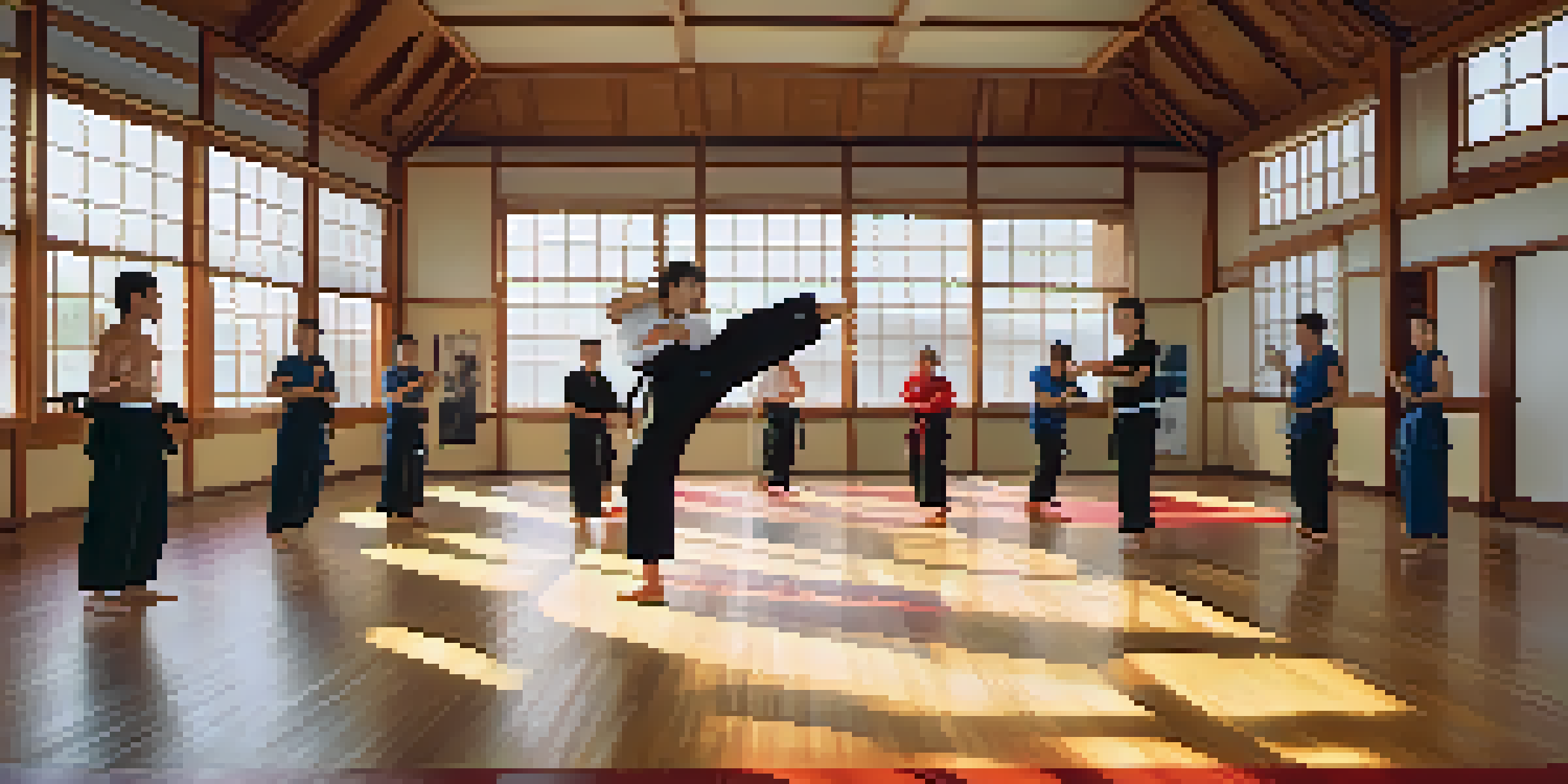Self Defense Skills: A Pathway to Improved Mental Resilience

Understanding Self-Defense and Its Importance
Self-defense is not just about physical skills; it's about empowerment. Learning techniques to protect oneself can significantly boost confidence, making individuals feel more secure in their surroundings. This confidence can spill over into other areas of life, enhancing overall well-being.
Self-defense is not just about protecting yourself, it's about creating a sense of empowerment and confidence.
Moreover, self-defense training teaches individuals to remain calm under pressure. The ability to think clearly in stressful situations is crucial, not only during physical confrontations but also in everyday challenges. This mental clarity is a vital aspect of resilience.
Ultimately, self-defense equips people with tools needed to face various life challenges head-on. Whether it's a physical altercation or a personal struggle, the skills learned can foster a proactive mindset, leading to a more resilient mental state.
The Connection Between Physical and Mental Resilience
Engaging in physical activities like self-defense enhances not just strength but also mental toughness. The body and mind are interconnected; when one is challenged, the other learns to adapt. This relationship is crucial for building resilience.

When you practice self-defense, you push your physical limits, which can translate into mental fortitude. Overcoming obstacles in training helps reinforce the belief that you can tackle challenges outside the dojo. This mindset is essential for navigating life's ups and downs.
Empowerment Through Self-Defense
Learning self-defense techniques boosts confidence and equips individuals to handle life's challenges more effectively.
In essence, the physical challenges faced during self-defense training prepare individuals to confront mental hurdles. As you learn to defend yourself, you're also training your brain to handle stress and adversity, creating a dual pathway to resilience.
Building Confidence Through Mastery of Techniques
One of the most significant benefits of learning self-defense is the sense of accomplishment that comes with mastering new techniques. Each new skill learned can bolster self-esteem and create a sense of achievement. This boost in confidence is foundational for resilience.
Strength doesn't come from what you can do. It comes from overcoming the things you once thought you couldn't.
Additionally, as individuals progress in their training, they often experience a shift in self-perception. They begin to see themselves not just as victims but as capable individuals. This transformation is powerful in building a resilient mindset.
Moreover, regular practice reinforces this confidence. With each session, you are reminded of your capabilities, which can be a profound motivator in other life areas, enhancing resilience and adaptability.
Stress Management Through Self-Defense Training
Self-defense training provides a unique outlet for stress relief. Engaging in physical activity is a well-known method for managing stress, and self-defense is no exception. It allows individuals to channel frustrations into focused movements, promoting mental clarity.
The adrenaline and endorphins released during training can also lead to improved mood and mental health. This biochemical boost acts as a natural stress reliever, making it easier to handle daily pressures. As a result, participants often find themselves more resilient to stressors outside the training environment.
Mental Resilience from Training
Self-defense training fosters mental toughness by challenging both the body and mind, preparing individuals to face stress and adversity.
Incorporating self-defense into one's routine can create a healthy coping mechanism for life's challenges. By learning to handle stress through physical activity, individuals can build a mental toolkit for resilience.
Developing Situational Awareness and Mindfulness
Self-defense training emphasizes the importance of situational awareness, which is the ability to be conscious of your surroundings. This skill is crucial not only for self-protection but also for personal safety in everyday life. Awareness fosters a sense of control, which is integral to mental resilience.
Moreover, practicing mindfulness during training can enhance focus and presence. By being fully engaged in the moment, individuals learn to control their reactions to stress. This practice of mindfulness can extend beyond training, helping to manage anxiety and maintain resilience in various situations.
Ultimately, situational awareness and mindfulness create a proactive mindset. This approach allows individuals to anticipate challenges and respond effectively, reinforcing their mental resilience.
Community Support and Connection Through Training
Joining a self-defense class often leads to a sense of community and belonging. Training alongside others fosters relationships and support systems that can be invaluable for mental health. This connection can provide additional motivation and encouragement to face challenges.
Communal training environments also encourage sharing experiences and coping strategies. Hearing others' stories can be uplifting and serve as reminders that everyone faces struggles. This shared journey can enhance resilience through mutual support.
Community Support Enhances Growth
Participating in self-defense classes creates a supportive community that encourages resilience through shared experiences and motivation.
In essence, the community aspect of self-defense training is a powerful tool for building mental resilience. The bonds formed can help individuals feel more grounded and supported as they navigate life's complexities.
Setting and Achieving Goals for Personal Growth
Self-defense involves setting goals, whether it's mastering a specific technique or preparing for a belt test. This goal-oriented approach fosters discipline and perseverance, essential traits for resilience. Achieving these goals can significantly boost self-esteem and motivation.
Furthermore, the process of working toward a goal teaches individuals the importance of patience and hard work. These lessons can be applied to various aspects of life, reinforcing the understanding that persistence pays off. This mindset is vital for overcoming obstacles.

In conclusion, setting and achieving goals within self-defense training can lead to substantial personal growth. Each success reinforces resilience, preparing individuals to face future challenges with confidence.